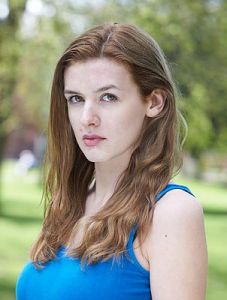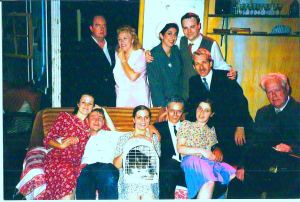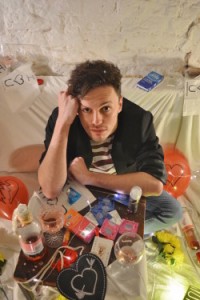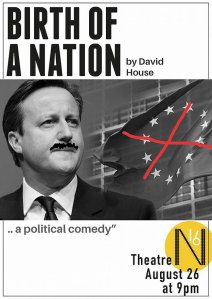Here I talk to the talented Ross McGregor, Offie nominated director of Arrows and Traps Theatre Company. He is directing his 10th show Crime and Punishment, Jack Broc Theatre Feb 7th to Feb 25th.
What excited you about the medium of theatre?
I’ve liked theatre from when I was a child. There’s something vital and exciting about it happening live in front of you. As an audience member I always loved feeling part of something ephemeral. It feels so much more collaborative and generous than other mediums, and there’s a connection between the audience and the actor that you don’t get in a cinema.
Arrows and Traps have gained a great reputation for it’s alternative and exciting take on Shakespeare. How did the company com about?
I decided to create Arrows & Traps because first and foremost I wanted to produce work. Actors have a hard time getting cast in things – but spare a thought for the directors. In any show in the West End right now, how many actors on average are in each one? 10-20? Plus understudies and swings? 20-30? Then how many directors are there in that show? Just the one. Plus an assistant, who doesn’t really get to direct. And a resident, who definitely doesn’t. Directing jobs are very scarce on the ground unless you create the opportunities yourself, and A&T was born out of that. I also wanted to build a repertory company of actors that worked across different projects with me, as I thought that sounded rare, exciting and challenging.
Did you always want to direct?
No, not initially. I was taken with being a writer. Fiction mainly, as that’s what I trained in. I picked up the directing bug as a student at Warwick University, actually as a late night dare taken to absurd lengths – and I just ran with it from there. That’s not to say I’m done with writing, in fact I think they’re two very similar disciplines – they’re both about telling stories as clearly and coherently as you can.
What do you find exciting about being a director?
I found the collaborative elements of directing theatre so exciting, watching each play develop and take shape. It’s not really a director’s medium in the way that film is. Theatre is about actors. You can help them most at the beginning, but after press night, your little Hedda Gablers and Hamlets are off out the nest, and all you can do is sit in the back row like a proud mother hen. The play will continue to tighten, hone and polish itself but it no longer needs the director to do that. That’s the most exciting thing about being a director – helping a potential group of strangers become a coherent, slick ensemble that understands the production inside out and together sculpt it into something exciting to watch.
To aspiring theatre directors, what advice would you give with some experience under your belt?
I think the best training for a director is to just get out there and direct. You can read all the books you like, but the best way to learn is to do it and fail, learn, get up and fail better. Grab every opportunity, and if there aren’t any open to you, then make your own. If you have an idea for a show then reach out to a venue. Make an introduction. Join some facebook groups to meet like-minded people. Don’t be afraid to ask for help. If you have passion to tell a particular story, then don’t let circumstances, limitations or other people hold you back. And once you’re in the rehearsal room, my only piece of albeit cliched advice is to trust your gut. If a brilliant idea of yours isn’t working, cut it. If you’re cringing, change it. If something’s not right, say something, even if you don’t have the answer – work it through. Don’t leave something unsaid because it’s awkward. The audience will see through bullshit instantly, so it’s important you are brave enough to do the same.
You have worked on alot of the fab Shakespeare productions Arrows and Traps has produced. What do you find exciting about Shakespeare? What approach do you take when looking at the texts to bring them alive?
I’ve directed all nine of Arrows & Traps theatre productions so far, and am about to start the tenth. Seven of those have been Shakespeare. When you helm a company that gets a reputation for doing Shakespeare, the assumption is that you’re a Shakespeare expert and a complete bard fanboy. But this is a little known fact about me: I don’t like Shakespeare. I find it too difficult, dry and obtuse. I hated it at school and just didn’t understand why the government were fixated with making our children study such boring literature, that’s not even in English half the time. I’ve been a director for about decade, on and off, and when I returned to theatre, when asking myself what it was I wanted to direct, I gave myself three criteria: “does it stand out from what other people are doing?”, “is it a challenge for me personally?”, and “does it sound exciting to an audience?” Shakespeare was always going to be the greatest challenge for me, because I disliked it for so long. I not only had to work out what was being said, but also how to approach it so it was interesting for an audience. I think that’s why a concept is so important to my Shakespeare work. I focus on something that I feel has not been brought out by other productions, and cultivate what I feel is a modern way of approaching Shakespeare. I have learned to love the plays we’ve done, and there are others that I would like to cover in the future. It’s always been a struggle for me, but I think that’s actually our greatest strength because I’m the first one the production has to impress. I’m no fan boy, I don’t shiver with rapture when Hamlet picks up a skull, in fact I’m the first one to yawn. So Arrows & Traps works to open these texts up for the non-shakespeare fan, for the ambivalent, for the discerning mainstream modern audience.
In rehearsals how do you like to get the most out of your actors, what do you feel makes a great working environment for a cast?
I think there’s a real danger for a director to get too enamoured by the sound of their own voice. There is power, and with that there is a danger of treating everyone like puppets. I never wanted to be that kind of director. Every director has to learn to step back a bit and trust in the people around them. They should never be domineering or close-minded in the rehearsal room. It’s an actor’s safe place. The cast should feel happy and comfortable there. It’s how they do their best work, how they give you their greatest and craziest ideas. Don’t try to control that. Support, never judge, and never scorn. Director dictatorships produce boring theatre as it’s just one voice talking. The best theatre is a chorus of voices, all lending their unique colour, pitch and timbre. More voices, more ideas, more influences, better theatre.
Crime and punishment is another epic you are taking on, how have you tackled the play to bring it up to date and put the usual Arrows and Trap spin on it?
Crime & Punishment is most of the most iconic Russian novels in history. It’s an sprawling multi-character epic. And as it’s the centenary of the Russian Revolution, it seemed timely to return to a Russian text this year, after our Anna Karenina last Spring. The adaptation we’re staging next month at the Jack Studio is a 90 minute 3-hander, so there’s been some judicious cutting involved. It’s unusual, I think, for a crime thriller to tell a story from the murderer’s perspective and that was interesting for me. With so many novel adaptations they seek to cram the entire book into an evening, and that never seems to quite work, throwing your audiences through various scenes at breakneck pace in an attempt to remain faithful to the source. This adaptation doesn’t do that. It seeks to create something theatrical and new from the story. It’s beautiful and moving, and a real test for the actors as its basically one long scene. I’m not sure what the Arrows spin is exactly, but yes, there will be dream sequences, lots of music and set pieces, and we’ll be showing an old story in a new way.
You do open castings, what do you suggest to actors interested in auditioning for your next show? What do you like to see an actor bring to an audition room?
First and foremost they have to be excited about the project and come with ideas about how they’d approach their characters. A degree of research into either the novel or play text is always impressive, but really we’re interested in you as a person and what you’d bring to the role. There’s an emphasis on ensemble in the company, and we like actors who are ready to muck in and get involved with the heavy lifting. We try to make the audition process as stress-free as possible, and want applicants to not be unnerved by the reading. It doesn’t matter to us if you don’t know it off by heart, or make a few slips or start again, if you can bring the text to life, that’s all that matters.
What is your favourite piece of theatre last year?
As a working director, it’s hard to get time to see anything that’s not your own work, but I adored In The Heights at King’s Cross this year, as well as Better Together – a new play at the Jack Studio Theatre.
What is the plans for 2017?
We’ve got Crime & Punishment opening at the Jack Studio Theatre next month, running February 7th – 25th, and after that we’ll be producing a new version of Frankenstein. We’re also planning to stage Death & The Maiden, which is a blistering thriller, before rounding the year off with some Shakespeare, of course. So lots to get excited about.


















